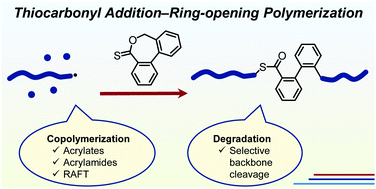Degradable vinyl copolymers through thiocarbonyl addition–ring-opening (TARO) polymerization†
Abstract
The radical copolymerization of the thionolactone dibenzo[c,e]oxepane-5-thione with acrylates, acrylonitrile, and N,N-dimethylacrylamide afforded copolymers containing a controllable amount of backbone thioesters which could be selectively cleaved. The process is compatible with RAFT polymerization and promising for the development of advanced degradable polymers.



 Please wait while we load your content...
Please wait while we load your content...